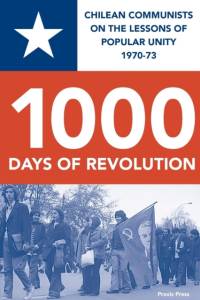Om 1000 DAYS OF REVOLUTION
1000 Days of Revolution contains nine chapters, each one written by a prominent Chilean communist as part of their party’s attempt to self-critically analyse the reasons for the defeat of President Salvador Allende's Popular Unity government from 1970-1973. The Chilean experience was a sustained attempt to advance to socialism through a non-armed revolutionary strategy based on a constitutionally elected government.
The conclusions reached in this volume reject both these extremes. Specifically, they stress the confirmation of two fundamental insights of Marxism. First, that the left cannot simply take over the existing machinery of government and the state from the existing ruling class and use it for different ends. Second that no successful revolutionary movement can succeed unless it can consolidate and maintain a political majority in society.
Key economic changes by Popular Unity, above all the nationalisation of the copper industry, sent shockwaves to Wall Street and the White House, where they feared that the Chilean experiment would be repeated elsewhere unless it was stopped – at any cost.
Starting with just 36% of the vote in the 1970 presidential elections, Popular Unity faced constant challenges to create and sustain a political majority and at the same time overcome the resistance from within the army, political elite and big business. It also faced the economic and political sabotage by the United States, leading to the coup on 11 September 1973, that cost Allende and thousands of his supporters their lives.
Visa mer

